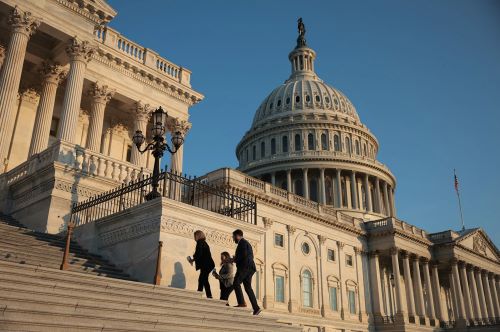

The Trump administration will have vastly more power and resources.

By Colin Seeberger
Senior Adviser, Communications
The Center for American Progress

By Andrea Ducas
Vice President, Health Policy
The Center for American Progress

By Natasha Murphy
Director, Health Policy
The Center for American Progress
Introduction
This week, congressional Republicans passed a radical budget and tax bill—the One Big Beautiful Bill Act—on a party-line vote. Many of the plan’s key elements will increase families’ costs for health care, food, and utilities—such as historic cuts to Medicaid and the Supplemental Nutrition Assistance Program (SNAP) as well as terminating tax credits to produce more American-made energy—and are deeply unpopular according to recent survey data. Several provisions, however, remain less understood because they’ve received less media attention or were added during rushed negotiations that took place overnight and behind closed doors.
This article details several lesser-known provisions of the One Big Beautiful Bill Act (OBBBA) that will increase costs and limit Americans’ ability to meet their basic needs; create a slush fund for Trump administration overreach; and waste taxpayer money.
Increasing Costs and Limiting Americans’ Ability to Meet Their Basic Needs
Defunding Planned Parenthood Clinics
The OBBBA includes a provision that would effectively defund Planned Parenthood clinics for one year. The bill would do this by prohibiting any health clinic that provides abortion care (even if that care is paid for privately) from accepting Medicaid funds for any other service they provide.
The Hyde Amendment already prohibits federal funds—including Medicaid dollars—from being used to cover abortion. This bill would go even further and prevent women on Medicaid from accessing any Planned Parenthood services, including sexually transmitted infection (STI) screening, Pap smears, breast cancer screenings, and prenatal care. This would be exceptionally harmful to Medicaid enrollees, as the majority of people with Medicaid receive contraceptives (85 percent) and STI services (57 percent) from Planned Parenthood clinics. Losing Medicaid funding would put 1 in 3 Planned Parenthood centers at risk of closure and would take away a vital source of health care for more than 1 million people.
Increasing Health Care Costs for More Than a Million Medicare Enrollees
While President Donald Trump has repeatedly promised not to cut Medicare benefits, the OBBBA blocks implementation of an existing regulation that makes it easier for eligible low-income Medicare beneficiaries to enroll in Medicare Savings Programs (MSPs) that lower Medicare premiums and out-of-pocket costs. MSPs make health care accessible for Medicare enrollees, who often live on very limited incomes and few assets. Without enrolling in the programs, even modest medical bills can be unaffordable and basic access to care can slip out of reach. Blocking the regulation would prevent states from streamlining and automating enrollment into MSPs.
As a result, the nonpartisan Congressional Budget Office (CBO) estimated that the earlier House-passed bill (with similar provisions also in the Senate-passed bill) would cause 1.3 million Medicare enrollees eligible for these programs to lose or forgo their Medicaid coverage and, therefore, be unable to access the assistance. The Center for American Progress previously estimated that Medicare enrollees eligible for two MSP programs—the Qualified Medicare Beneficiary (QMB) Program and the Specified Low-Income Medicare Beneficiary (SLMB) Program—would be hit especially hard. These programs benefit Medicare enrollees living at or just above the federal poverty level (FPL). A couple on Medicare who are eligible for but no longer able to enroll in the QMB, making a combined $21,000 per year, could see their out of pocket costs skyrocket by $8,340. A single Medicare enrollee making only $19,000 per year and eligible for SLMB could see their out of pocket costs jump by $3,300 per year if they are unable to enroll in the program as a result of the bill.
Imposing New Out-of-Pocket Costs on Medicaid Enrollees
All states currently have the option to impose out-of-pocket costs such as premiums and copayments on some Medicaid enrollees (and subject to specific rules). The OBBBA goes significantly further by forcing states to charge Medicaid enrollees with family incomes between 100 percent and 138 percent of the FPL—just $15,650 for a single adult—who qualify for the program based on income alone up to $35 per health care service. While cost-sharing would be capped at 5 percent of a family’s household income, that can add up to thousands of dollars per year. Consider a Medicaid expansion adult in a family of four with an income of only $33,000, effectively right above 100 percent of the FPL. That family could be on the hook for up to $1,650 in new, mandatory out-of-pocket costs. What’s more, the bill also allows providers to turn patients away who can’t afford to pay those costs. Research consistently shows that even modest increases in out-of-pocket costs create significant financial barriers for low-income people. This burden often leads to reduced use of care and poorer health outcomes.
Ripping Food Assistance Away from Children Aging Out of Foster Care, Veterans, and the Homeless
The OBBBA reverses bipartisan SNAP paperwork-requirement exemptions for vulnerable groups of Americans, including veterans; people experiencing homelessness; and youth aging out of foster care that were passed into law in 2023. The CBO estimated this change would kick 270,000 people in these categories off of their food assistance for three years for not being able to comply with the burdensome task of constantly providing proof they are working enough hours. These groups of SNAP beneficiaries are particularly vulnerable to food insecurity and face barriers that make it more difficult to find and keep a stable job when, for instance, they have little work experience beyond military service; do not have a permanent address; or never graduated high school. Ending these exemptions will cause hunger and poverty to spike among communities that already face severe economic hardship.
Introducing a New Student Loan Repayment Plan That Will Increase Monthly Payments
The OBBBA eliminates existing student loan repayment plans and offers future student loan borrowers only two options for repayment plans: a standard plan and the Repayment Assistance Plan (RAP). Currently, there are four income-driven plans available, including the Biden-Harris administration’s Saving on a Value Education (SAVE) plan—the most affordable repayment plan in history. The OBBBA eliminates all four of these plans and offers borrowers only the RAP, which would dramatically increase payments, especially relative to SAVE. One analysis found that a typical borrower with a college degree would pay an additional $2,929 per year in student loan payments under RAP. By increasing the cost of monthly payments, the OBBBA forces borrowers to choose between affording their student loan payments and other essential expenses or risking the devastating financial consequences of default.
Creating a Slush Fund for Unaccountable Trump Administration Overreach
$30 billion for Trump’s Out-of-Control Deportation Force
The OBBBA provides nearly $30 billion to immensely expand enforcement and deportation operations of U.S. Immigration and Customs Enforcement (ICE), tripling its 2024 annual budget. These funds will supercharge lawlessness by an agency that the Trump administration has operated without accountability, causing chaos in communities across the country. ICE’s misuse of its authority—directed by the Trump administration—has resulted in reckless and unfettered actions against immigrants, U.S. citizens, and public officials. It has invited brazen conduct by other federal agents, including violence toward members of Congress. Their actions have shocked the nation and multiple federal courts have found them unlawful.
Under the Trump administration, ICE officers snatched students off the streets for exercising their freedom of speech; brazenly detained U.S. citizens without regard for their rights; and deported U.S. citizen children, including a 4-year-old with cancer. ICE was also key in facilitating the deportation of nearly 250 people to a notorious gulag in El Salvador without due process under a shady deal the Trump administration made with President Nayib Bukele. The administration’s indiscriminate actions have touched key industries, including agriculture, and have terrified farm workers across the country. It has affected locations such as the Central Coast and San Joaquin Valley in California. Despite voting for the OBBBA, six Republican members of Congress wrote a powerful letter raising concerns and seeking answers on the indiscriminate enforcement. The letter states, “Every minute that we spend pursuing an individual with a clean record is a minute less that we dedicate to apprehending terrorists or cartel operatives.”
Under this bill, the Trump administration will have vastly more power and resources to swell a deportation force that makes no distinction between cartel operatives or those with violent criminal records and hardworking people. Seeing this legislation as a license to continue this sort of reckless overreach, the administration will continue to act lawlessly, ignore the Constitution, and chip away at American democracy.
Giving Trump’s Radical OMB Director and Project 2025 Architect a $100 Million Slush Fund
The OBBBA appropriates $100 million in funding for the White House Office of Management and Budget, led by director and Project 2025 co-author Russell Vought, “for the purposes of finding budget and accounting efficiencies in the executive branch.” Vought is the architect of the administration’s efforts to illegally impound funds, violating budgetary requirements to spend funds duly appropriated by Congress, pursuant to funding laws themselves, the relevant authorizing laws, and the Impoundment Control Act.
Since January, the administration has aggressively refused to spend appropriated funds across multiple agencies, including funds for high speed Internet; affordable housing; upgraded roads and bridges; and life-saving research at the National Institutes of Health (NIH). The administration also has trampled on Congress’ constitutional authorities in nearly shutting down the Consumer Financial Protection Bureau, an agency that has returned over $21 billion to consumers. In March, Senate Republican Appropriations Committee Chair Susan Collins (R-ME) initiated a letter arguing President Trump illegally withheld $2.9 billion approved by Congress. And, just this week, the Trump administration confirmed it is refusing to release nearly $7 billion in federal funding for after-school and summer programs that serve about 1.4 million students.
The $100 million slush fund created by Congress could hypercharge all these arguably illegal actions that Vought and the administration have taken, further imperiling everyday Americans.
Wasting Taxpayer Money
Incentivizing Waste and Poor Program Administration for SNAP State Waivers
In order to secure a key vote from Sen. Lisa Murkowski (R-AK) and pass muster with the Senate parliamentarian, the OBBBA was altered to temporarily exempt states with the highest error rates from a provision that would shift the costs of SNAP benefits from the federal government to state governments. Alaska, which had the highest error rate in the country in fiscal year 2024, would uniquely benefit, as would the District of Columbia, Florida, Georgia, Maryland, Massachusetts, New Jersey, New Mexico, New York, and Oregon. This odd construction clearly penalizes states with middle-of-the-road error rates, which could incentivize those that cannot get their error rates under the threshold for exemption from state contributions to instead do nothing to address their error rates—or even loosen their administrative standards to allow more errors to take place. This backwards approach was clearly designed to shift billions of dollars in an unfunded mandate to states. However, it was done in a way that catered to one senator’s vote rather than in a way that incentivizes good program administration.
Gives Startup Investors an Additional $5 Million in Tax-Free Income
The OBBBA’s “qualified small business stock exclusion” allows wealthy venture capitalists to claim $10 million in income tax-free for investing in certain startup companies. The Treasury reports that over 75 percent of the benefits of this provision flow to millionaires. Outside analysis finds that it is a frequent target of abuse by investment companies. Republicans could have addressed abuse in this program or canceled this tax-free giveaway, as bipartisan groups have called for. Instead, the OBBBA increases the amount millionaires are allowed to take home tax-free to $15 million per investment. Subsidizing these investors will cost taxpayers $17 billion.
Diverting Public School Funding to Benefit Wealthy Families
The OBBBA includes a federal 100 percent tax credit for individuals who donate to private school voucher funds. The legislation creates a permanent uncapped program that could cost the federal government nearly $51 billion annually. Comparatively, the federal government provides just $14 billion for funding under the Individuals with Disabilities Education Act and $18 billion for Title I funding for high-poverty schools. Private school voucher programs have been shown to benefit wealthy families over those in-need; harm rural communities and students with disabilities; and enable discrimination against students—all without improving academic achievement. Private school voucher programs disproportionately harm rural communities in particular, given their small operating margins for public schools and lack of accessible private schools.
When private school voucher programs lead to state funding cuts for public education, rural schools are hit the hardest due to their heavy reliance on state and federal funds. This ultimately results in stripping rural public schools of their few resources, leading to school closures and less opportunity for rural students. Across the country, this diversion of funds from public schools to private schools will eliminate opportunities for the more than 80 percent of students who attend traditional public schools to instead pay for wealthy families to send their kids to private school.
Conclusion
By stripping away health care and food assistance from working-class people and undermining production of American-made energy, the OBBBA will increase the cost of living and lower after-tax income for the bottom 40 percent of earners while giving the top 20 percent of earners a $6,000 per year average tax cut. Several lesser-known, yet no less extreme, changes to the bill will further increase costs, embolden the Trump administration’s overreach, and waste taxpayer dollars.
Originally published by The Center for American Progress, 07.03.2025, republished with permission educational, for non-commercial purposes.


